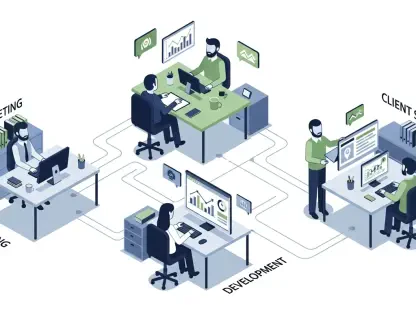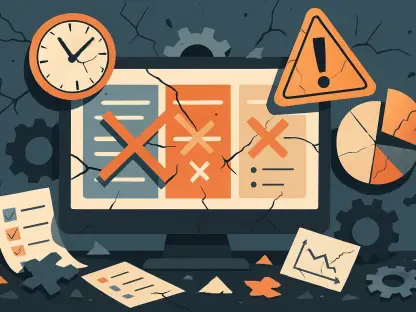In an era where climate change poses unprecedented challenges to global industries, the logistics and shipping sectors are under increasing pressure to slash greenhouse gas emissions and adopt sustainable practices. A groundbreaking collaboration between two industry giants has emerged as a beacon of hope, demonstrating how strategic partnerships can drive meaningful progress toward a greener future. This alliance focuses on integrating innovative solutions to tackle Scope 3 emissions—those indirect emissions tied to a company’s value chain—while setting a precedent for others to follow. By prioritizing sustainability, this partnership not only addresses immediate environmental concerns but also aligns with long-term global goals for net-zero emissions, offering a glimpse into how transformative action can reshape supply chains worldwide.
Pioneering Sustainable Logistics Solutions
Innovating with Sustainable Marine Fuels
The collaboration between these logistics leaders centers on a bold initiative to integrate second-generation biofuels into marine shipping operations. Derived from waste and residue feedstock, these biofuels present a viable alternative to traditional fossil marine fuel oil, significantly cutting emissions on a well-to-wake basis, which accounts for the entire lifecycle from production to usage. A landmark achievement in this effort was the successful completion of an initial order that reduced 25,000 tons of CO2e emissions, marking a tangible step forward in decarbonizing maritime transport. This move highlights the potential of sustainable fuels to transform an industry historically reliant on carbon-intensive energy sources, paving the way for broader adoption across fleets.
Beyond the immediate impact of emission reductions, the use of biofuels reflects a strategic shift toward embedding sustainability into core business practices. This approach not only addresses environmental imperatives but also responds to growing customer demand for greener logistics options. By investing in alternative fuels, the partnership demonstrates a commitment to overcoming challenges such as limited global supply and higher costs, ensuring that sustainability does not remain a niche concern but becomes a scalable reality. The focus on second-generation biofuels also mitigates concerns about land-use conflicts often associated with first-generation alternatives, reinforcing the viability of this solution for long-term decarbonization goals.
Leveraging the ‘Book and Claim’ Mechanism
Another cornerstone of this partnership is the innovative ‘book and claim’ mechanism, a system designed to decouple emission reductions from the physical use of sustainable fuels. This approach allows customers to claim environmental benefits without being tied to the specific logistics of fuel deployment, offering flexibility in an industry where supply constraints often hinder progress. By enabling accurate tracking and allocation of emission reductions, this tool ensures transparency and accountability, making it easier for companies to report progress on their decarbonization targets and meet regulatory requirements.
The significance of the ‘book and claim’ system extends beyond operational convenience, as it serves as a catalyst for early action in sustainability efforts. With sustainable marine fuels not yet widely available at every port, this mechanism bridges the gap between ambition and reality, allowing businesses to invest in emission reductions today rather than waiting for infrastructure to catch up. It also fosters collaboration across the supply chain by aligning the interests of shippers, carriers, and customers, creating a shared framework for environmental accountability. This innovative solution underscores the importance of adaptive strategies in tackling the complex challenges of decarbonizing global logistics.
Setting Ambitious Goals for a Greener Future
Aligning with Long-Term Emission Targets
A defining feature of this partnership is the alignment of both companies with ambitious long-term environmental goals, reflecting a shared vision for a sustainable future. One company aims to achieve net-zero fleet emissions by 2045, while the other targets net-zero greenhouse gas emissions across its operations by 2050. These timelines underscore a commitment to not only reducing immediate environmental impact but also ensuring that sustainability becomes an integral part of business strategy over the coming decades, setting a high standard for the industry as a whole.
This alignment with net-zero goals is more than aspirational; it is backed by concrete actions and investments in scalable solutions. The partnership serves as a model for how collaboration can accelerate progress toward these targets, particularly in addressing Scope 3 emissions, which are often the most challenging to mitigate due to their indirect nature. By focusing on joint initiatives, the companies are creating a ripple effect, encouraging other stakeholders in the logistics and shipping sectors to adopt similar frameworks. This collective momentum is critical for driving systemic change and ensuring that the industry keeps pace with global climate imperatives.
Empowering Customers through Green Products
The collaboration also emphasizes empowering customers to play an active role in decarbonization through tailored sustainability offerings. Products like GoGreen Plus and Ship Green enable clients to reduce their own Scope 3 emissions by opting for greener shipping solutions, integrating environmental considerations into their supply chain decisions. These initiatives provide transparent reporting mechanisms, allowing businesses to track and showcase their progress toward climate goals, which is increasingly vital in a market where sustainability is a competitive differentiator.
Moreover, these customer-centric solutions reflect a broader trend of integrating sustainability into value propositions, ensuring that environmental responsibility is not just a corporate obligation but a shared journey. By offering accessible tools and options, the partnership helps clients navigate the complexities of decarbonization, from understanding emission baselines to implementing reduction strategies. This focus on customer empowerment not only amplifies the impact of the collaboration but also builds trust and loyalty, as businesses increasingly seek partners who align with their environmental values. The success of these offerings highlights the transformative potential of blending innovation with accessibility in logistics.









